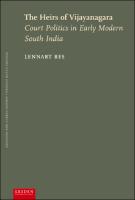The Heirs of Vijayanagara
Court Politics in Early Modern South India
Author(s)
Bes, Lennart
Collection
Dutch Research Council (NWO)Language
EnglishAbstract
This comparative study investigates court politics in four kingdoms that succeeded the s outh Indian Vijayanagara empire during the sixteenth to eighteenth centuries: Ikkeri, Tanjavur, Madurai, and Ramnad. Building on a unique combination of unexplored Indian texts and Dutch archival records, this research offers a captivating new analysis of political culture, power relations, and dynastic developments.
In great detail, this monograph provides both new facts and fresh insights that contest existing scholarship. By highlighting their competitive, fluid, and dynamic nature, it undermines the historiography viewing these courts as harmonic, hierarchic, and static. Far from being remote, ritualised figures, we find kings and Brahmins contesting with other courtiers for power. At the same time, by stressing continuities with the past, this study questions recent scholarship that perceives a fundamentally new form of Nayaka kingship. Thus, this research has important repercussions for the way we perceive both these kingdoms and their ‘medieval’ precursors.
Keywords
South Asia, India, kingship, courts, modern history, diplomacy, political historyDOI
10.24415/9789087283711ISBN
9789087283711, 9789400604162Publisher
Leiden University PressPublisher website
https://www.lup.nl/Publication date and place
Leiden, 2022Imprint
LUP AcademicSeries
Colonial and Global History through Dutch Sources, 5Classification
Asian history
Politics and government
India


 Download
Download Web Shop
Web Shop